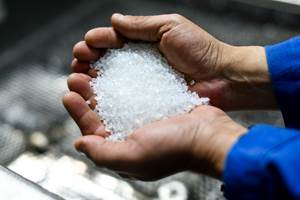Südpack and Clean Cycle Invest in Carboliq Chemical Recycling
The global film manufacturer and flexible packaging investment firm have a long-term investment in Rencenso’s Carboliq technology.
Global plastic film manufacturer Südpack (U.S. office in Appleton, Wisc.) and Netherlands-based Clean Cycle, founded by the entrepreneurial Last family which is active in the fields of flexible packaging and the sole owner of the Scholle IPN Group (U.S. office in Elmhurst, Illinois), a leader in the liquid flexible packaging industry, have entered into an agreement for a long-term investment in what is said to be the unique Carboliq chemical recycling technology developed by Germany’s Recenso. The latter, is a specialist in the design and implementation of systems for resource recovery and provides advanced recycling solutions. Their portfolio includes machinery and systems for both physical (mechanical) and chemical recycling based on the Carboliq process.
The decision is the logical consequence of the cooperation between Südpack and Resenso’s Carboliq about a year ago. The company manufactures and operates plants for oil recovery from mixed and contaminated plastic wastes. Carboliq supplies the circular liquid resource (CLR) it produces via its depolymerization process to the petrochemical industry which uses it as a substitute for fossil raw materials in the manufacture of new, high-end polymers. Now the three companies Südpack, Clean Cycle, and Resenso’s Carboliq have pooled their expertise in the area of material management with chemical recycling. Their aim is to further expand available capacities for the innovative and highly efficient chemical recycling of a wide range of plastics.

With the operation of the pilot plant at the disposal center in Ennigerloh, Südpack and Carboliq have proved that numerous material fractions as well as mixed and contaminated plastic wastes can be converted into a valuable resource. Apart from the large diversity of input materials, the CARBOLIQ process offers competitive advantages in terms of energy efficiency and low emissions. The oil recovered is virgin-grade quality and can be used by the plastics industry in the same way as fossil fuels to produce a wide spectrum of plastic granulates. These granulates can in turn be processed to produce high-performance films for sophisticated packaging applications which are required above all in the food industry.
So far, the cooperation partners have successfully applied the technology both for resource recovery from their own recyclable material flows as well as for recycling packaging materials from processing and from end customers. The Recenso plants for direct oiling work according to the catalytic tribochemical conversion (CTC) process and are unique in the world.
The investment in Carboliq creates a powerful company that will in the medium term continually expand its capacities for highly efficient recycling of a wide variety of plastics. “Fundamentally, our joint vision is tackling the problem of high-performance flexible packaging materials that can’t be mechanically recycled with current technology. We aim to make them recyclable and therefore compatible with future needs. Thanks to the investment by Südpack and Clean Cycle, we’ll be able to create a closed-loop, high-performance and industrial-standard system that also handles these products. It will allow us to exploit the extremely promising potential of our technology,” explained Carboliq’s CEO Christian Haupts.
Said Südpack business unit manager Dirk Hardow. “In a wide range of applications, for example in the food industry, high-performance multilayer films with effective protective functions are the most efficient solutions for keeping all kinds of food fresh. And they’ll remain the best choice in the future. That’s because they provide maximum product protection at minimum added weight. However, the drawback is that they can’t be mechanically recycled. Now Carboliq offers a key system component for creating a circular economy in the food packaging industry which can’t be achieved solely with mechanical recycling, also due to existing legislation.”
Said Laurens Last of Clean Cycle Investments,“We very deliberately incorporated the word ‘Cycle’ into our company’s name because we see the circular system as our top priority. We’re fully confident that chemical recycling will play a crucial role in achieving a sustainable circular economy that even includes high-performance plastic packaging.”
Related Content
Lanxess and DSM Engineering Materials Venture Launched as ‘Envalior’
This new global engineering materials contender combines Lanxess’ high-performance materials business with DSM’s engineering materials business.
Read MorePart 3: The World of Molding Thermosets
Thermosets were the prevalent material in the early history of plastics, but were soon overtaken by thermoplastics in injection molding applications.
Read MorePrices for All Volume Resins Head Down at End of 2023
Flat-to-downward trajectory for at least this month.
Read MorePrices Up for PE, ABS, PC, Nylons 6 and 66; Down for PP, PET and Flat for PS and PVC
Second quarter started with price hikes in PE and the four volume engineering resins, but relatively stable pricing was largely expected by the quarter’s end.
Read MoreRead Next
See Recyclers Close the Loop on Trade Show Production Scrap at NPE2024
A collaboration between show organizer PLASTICS, recycler CPR and size reduction experts WEIMA and Conair recovered and recycled all production scrap at NPE2024.
Read MoreFor PLASTICS' CEO Seaholm, NPE to Shine Light on Sustainability Successes
With advocacy, communication and sustainability as three main pillars, Seaholm leads a trade association to NPE that ‘is more active today than we have ever been.’
Read MorePeople 4.0 – How to Get Buy-In from Your Staff for Industry 4.0 Systems
Implementing a production monitoring system as the foundation of a ‘smart factory’ is about integrating people with new technology as much as it is about integrating machines and computers. Here are tips from a company that has gone through the process.
Read More


























